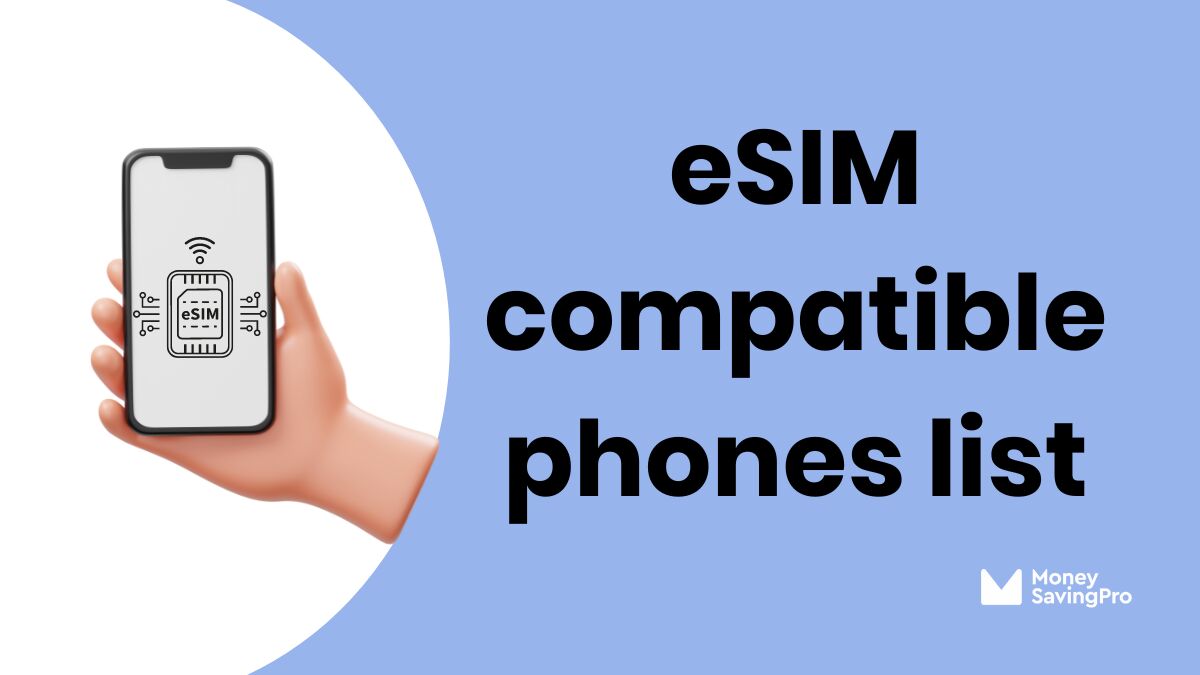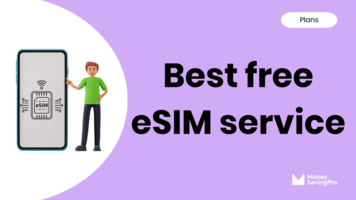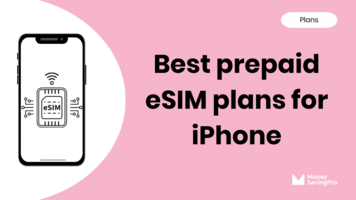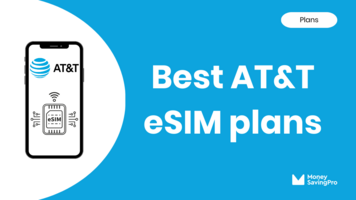
MoneySavingPro independently researches the products & services to bring you our recommendations. We may earn money when you click our links - disclosure policy.
If you want to cut costs and switch to a more affordable cell phone plan, eSIM plans might just be the ticket.
But to do this, you'll need a phone that supports eSIM. The good news is that most phones made since around 2018 have some form of eSIM-compatibility.
In this guide, I'll dive into eSIM-compatible phones and how you can check if your current cell phone supports eSIM technology.
eSIM compatible iPhones
Many Apple devices support eSIM technology, including a variety of iPhones:
- iPhone 15
- iPhone 15 Plus
- iPhone 15 Pro
- iPhone 15 Pro Max
- iPhone 14
- iPhone 14 Plus
- iPhone 14 Pro
- iPhone 14 Pro Max
- iPhone 13
- iPhone 13 Mini
- iPhone 13 Pro
- iPhone 13 Pro Max
- iPhone 12
- iPhone 12 Mini
- iPhone 12 Pro
- iPhone 12 Pro Max
- iPhone 11
- iPhone 11 Pro
- iPhone 11 Pro Max
- iPhone SE 2 (2022)
- iPhone SE 3 (2023)
- iPhone XR
- iPhone XS
- iPhone XS Max
By using the built-in eSIM, you can conveniently activate new plans and explore cheaper options without the hassle of visiting a store or waiting for a new SIM card to arrive in the mail.
eSIM compatible Android phones
Don't worry, Android users – you have options too! Many Android devices also support eSIM:
Samsung phones with eSIM
- Samsung Galaxy S23 Ultra
- Samsung Galaxy S23+
- Samsung Galaxy S23
- Samsung Galaxy S22 Ultra
- Samsung Galaxy S22+
- Samsung Galaxy S22
- Samsung Galaxy S21+ Ultra 5G
- Samsung Galaxy S21+ 5G
- Samsung Galaxy S21
- Samsung Galaxy S20 Ultra 5G
- Samsung Galaxy S20 Ultra
- Samsung Galaxy S20+ 5g
- Samsung Galaxy S20+
- Samsung Galaxy S20
- Samsung Galaxy Note 20 Ultra 5G
- Samsung Galaxy Note 20
- Samsung Galaxy Z Flip5 5G
- Samsung Galaxy Z Flip4
- Samsung Galaxy Z Flip3 5G
- Samsung Galaxy Z Flip
- Samsung Galaxy Z Fold5 5G
- Samsung Galaxy Z Fold4
- Samsung Galaxy Z Fold4
- Samsung Galaxy Z Fold3 5G
- Samsung Galaxy Z Fold2 5G
- Samsung Galaxy Fold
- Samsung Galaxy A54 5G
Google phones with eSIM
- Google Pixel 2 (only phones bought with Google Fi service)
- Google Pixel 2 XL
- Google Pixel 3 (only phones bought with Google Fi service)
- Google Pixel 3 XL
- Google Pixel 3a
- Google Pixel 3a XL
- Google Pixel 4
- Google Pixel 4a
- Google Pixel 4 XL
- Google Pixel 5
- Google Pixel 5a
- Google Pixel 6
- Google pixel 6a
- Google Pixel 6 Pro
- Google Pixel 7
- Google Pixel 7 Pro
- Google Pixel Fold
Motorola phones with eSIM
- Motorola phones with eSIM
- Motorola Razr 2019
- Motorola Razr 5G
- Motorola Razr 40
- Motorola Razr 40 Ultra
- Motorola Razr+
- Motorola Edge+
- Motorola Edge 40 Pro
- Motorola G52J 5G
- Motorola G52J 5G II
- Motorola G53J 5G
What should I do if I don't have an eSIM-compatible phone?
If you're not currently using an eSIM-compatible phone, don't worry. You can compare cell phone deals with low-cost carriers, like Mint Mobile and Boost Mobile, which offer eSIM-compatible phones with affordable monthly payment plans.
However, if your main concern is saving money, you don't need an eSIM-compatible phone for that. With MVNO plans, you can save up to $700 a year on your cell phone bill using a traditional SIM card.
eSIM compatible phones FAQs
An eSIM (embedded SIM) is a virtual SIM card built into your phone, allowing easy switching between carriers and plans.
Most cell phones from around 2018 onwards are eSIM-compatible. You can check in your settings to find out if your phone has eSIM support.
Recap - eSIM supported phones
Switching to an eSIM-compatible phone opens doors to even more flexibility, as well as helping you save hundreds on your bill.
Many iPhones and Android devices offer eSIM support, making finding the cheapest cell phone plans more convenient.
If your current phone doesn't support eSIM, you can upgrade to an eSIM-compatible phone, with plenty of budget-friendly options available from MVNOs.











